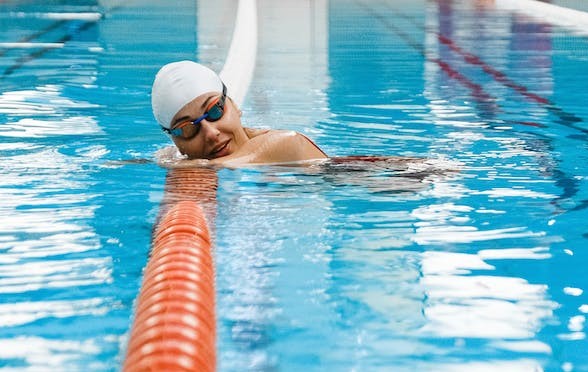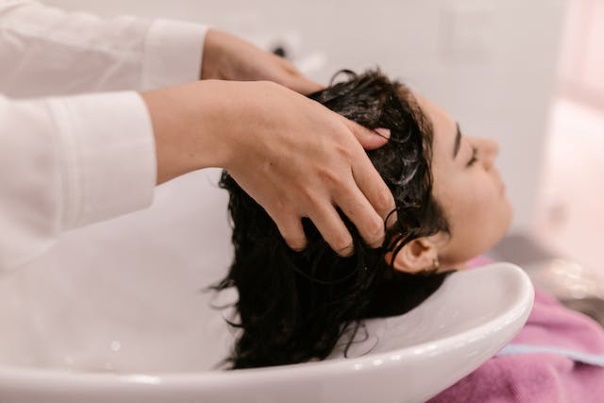Should You Wash Your Hair After Swimming? The Dip-and-Decide Guide
Whether you’re diving into a chlorinated pool or saltwater pool, or even in the ocean waves, the post-swim hair routine presents a question: wash or skip?
The answer, as with most things in life, depends on a few factors. In this guide, I will help you to know everything about post-swim hair care, leaving you with a clean and happy crown of glory on your head, no matter where you take your next plunge.
The simple answer is yes. Clean your hair with mild shampoo and fresh water after swimming. This will remove any traces of the swimming pool chemicals. While you wear a swimming cap to protect your blonde hair from chlorine, you need to give it good post-swimming care. Remember, chlorine strips the natural oil off the hair, making it stiff, and if neglected, it can encourage frizz.
Should you wash your hair after swimming if you wear a swimming cap?

If you like to wear the best swimming cap, you might wonder whether you still need to wash your hair after a dip in your above-ground swimming pool.
While a cap certainly shields your strands from the brunt of chlorine and salt, some residue can still sneak through, especially if your hair was wet underneath.
If you plan on styling your hair later, a gentle cleansing with a sulfate-free shampoo to remove any lingering chemicals is recommended.
For a quick dip with minimal sweat, a thorough rinse with fresh water might suffice. Ultimately, listen to your hair; if it feels stiff or smells of chlorine, a wash is your wisest choice.
Some cap such as the silicone swimming caps can keep water out of your hair. If you wore such and intend to treat your hair later in a salon, you can skip the wash-after-swim.
What happens if you don’t clean your hair after swimming?
Forgoing a post-swim wash for your hair has its consequences, particularly for fragile or color-treated hair.
Chlorine and salt water are notorious hair dryness-inducers, leaving your hair feeling brittle and prone to breakage.
Minerals in salt water can even build up, creating a dull, chalky texture. Chlorine’s chemical punch can also fade hair color and accelerate frizz, turning your once-luscious locks into a tangled mess.
If you frequently skip the wash, be prepared for potential scalp irritation and even dandruff as the residue accumulates.
You can see more about how chlorine damages hair in my article on: Is chlorine bad for your hair?
You also need to stay on top of the state of your hair so that if it starts to feel too dry or stiff, you can see your hairstylist. Some hair problems are not even caused by chlorine; it just triggers them.
For instance, thin hair is more vulnerable to damage than a thick mane. If this is you, you need to take excellent care of your hair.
How can chlorine damage your hair?
Shocking the pool with chlorine, or adding the recommended amounts of chlorine for maintenance, guards against unwanted microorganisms.
This makes the pool safe to swim in even when you have skin issues. In fact, you can even swim with a yeast infection!
Unfortunately, the same chlorine also acts as a harsh hair villain. Its oxidizing properties strip away the natural oils, proteins, and moisture, leaving strands dry, brittle, and vulnerable to damage.
The severity of hair damage depends on factors like chlorine levels, exposure time, and your hair’s natural health.
Swimming every day without proper hair care can lead to split ends, fading color, and increased breakage.
What happens if you don’t wash your hair after swimming in salt water?

While saltwater’s mineral infusion might sound beneficial, you know, like swimming in the Dead Sea has its benefits, but it too, comes with its challenges.
The drying potential of salt, coupled with its ability to cling to hair, can leave your locks thirsty and tangled.
Additionally, prolonged exposure can dull color and weaken strands. Unlike chlorine, however, saltwater may initially add a bit of textural volume, which some swimmers enjoy.
Just remember, rinsing and proper follow-up care are essential even after taking a saltwater swim.
How to wash hair after swimming
Chlorine is bad for your skin, and it is definitely worse for your hair. Therefore, you must wash it out as soon as possible, well, unless you are going for a proper hair treatment at the salon soon.
Remember, post-swim hair cleaning is recommended even if you wear your swimming cap.
Here are a few steps to follow to clean your hair after swimming in a chlorinated pool:
Step 1: Rinse the hair thoroughly
Before reaching for the shampoo, rinse your hair thoroughly with fresh water. This removes the bulk of chlorine, salt, and other residues. It is also recommended that you rinse your skin in the shower. Also, chlorine is bad for your eyes, so if some get inside, rinse the eyes too.
Step 2: Sulfate-free cleanse
Opt for a sulfate-free shampoo designed for delicate hair or post-swim care. It effectively removes the remaining chemicals without stripping the hair of its natural oils.
Step 3: Use a hair conditioner
Deeply condition your hair with a nourishing mask or conditioner to replenish lost moisture and combat dryness. Focus on the ends, where the damage is most likely to happen.
Step 4: Cool down the rinse
Finish with a cool water rinse to seal the hair cuticles and prevent frizz. This should lock in the hair conditioner inside the strands so that it unleashes its magic slowly, and surely.
Step 5: Dry the hair gently
Skip the heat styling for now. Towel-dry gently and let your hair air-dry naturally whenever possible.
The best way to do this is to tie the hair with a microfiber towel, turban-style, and leave it like that for some time. The towel will absorb all the water from the hair.
You could also tap-dry or squeeze-dry the hair with a t-shirt until it absorbs all the water. However, this works best for short hair.
Check out these articles on:
Can you swim in the ocean with herpes?
Can you swim with a UTI infection?
Wrapping it up
Ultimately, the decision to wash your hair after swimming depends on your hair type, how many times you swim in a week, and the level of exposure to chlorine or salt.
If you swim just once in a while, you can shampoo your hair lightly to remove the traces of chlorine from the hair.
A quick rinse using fresh water and a mild shampoo can help your hair a great deal, and you should wash it immediately when you get out of the pool.
Remember to do the same even when you have been swimming in open water. It contains natural chemicals, heavy metals, and other contaminants that can harm your hair.
